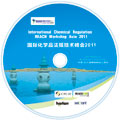23 December 2011
Leo Heezen, Manager of Global Chemicals Policy at European Chemical Industry Council (Cefic), made a speech on the global industry’s voluntary initiative for supply chain product stewardship on the first day of REACH workshop 2011.
 Mr Heezen first introduced the background of the initiatives in topic, Responsible Care and Global Product Strategy (GPS) in particular, operated by the International Council of Chemical Associations (ICCA). In 2006 ICCA launched the Responsible Care Global Charter, which has made substantial contribution to UN’s Strategic Approach to International Chemicals Management (SAICM) program. This voluntary initiative focuses on continuous improvement of global chemical industry in health, safety and environmental (HSE) performance.
Mr Heezen first introduced the background of the initiatives in topic, Responsible Care and Global Product Strategy (GPS) in particular, operated by the International Council of Chemical Associations (ICCA). In 2006 ICCA launched the Responsible Care Global Charter, which has made substantial contribution to UN’s Strategic Approach to International Chemicals Management (SAICM) program. This voluntary initiative focuses on continuous improvement of global chemical industry in health, safety and environmental (HSE) performance.
Consequently, Responsible Care has fostered the development of the ICCA GPS which seeks to improve the industry’s management of chemicals including the communication of chemical risks throughout the supply chain. Through Responsible Care, the chemical industry is reporting and tracking its progress on critical elements of product stewardship and is making further improvements to its current processes.
To help the chemical industry with their product stewardship, ICCA GPS initiative releases the Product Stewardship Guidelines which mainly provides solutions to two questions: one is how to manage HSE aspects of a chemical product through its entire lifecycle; the other is how to assist companies in implementing product stewardship in their management systems.
Mr Heezen talked about some current challenges faced by the industry and the necessity of establishment of a harmonized global standard in product HSE performance. “Currently chemical legislations are creating a patchwork of conflicting rules and procedures. What we are seeing are different requirements, some of which are very specific to particular countries, but which the chemical industry perceives as being barriers to trade in chemicals. We need a way of harmonising chemical management systems so that these additional requirements will not exist anymore and there can be freer trade relations between countries.”
To achieve this goal, ICCA Global Product Strategy begins with the harmonization of chemical risk assessment. In ICCA’s GPS Guidance on Risk Assessment, recommended practices are given on how to perform risk assessment following a series of steps such as information gathering, prioritizing substances into tiers, hazard characterization & exposure assessment, conducting risk characterization and communication of substance safety summary. Heezen noted that this Guidance “provides the industry with a best practice that could help shape the chemical management systems of developing countries and assist companies lacking in HSE expertise” as it adopted a user-friendly language easily understood by the general public.
GPS puts forward a “base set of information” which contains the baseline of hazard and exposure data required of risk characterisation. The base-set standard parameters list in total 18 data items divided into three groups (identity, physical/chemical and tox/ecotox). And the base set defines four tiers (minimal, low, medium, high risk potential) with increasing toxicological and ecotoxicological data requirements based on the hazard potential and/or human/ecological exposure of a substance. Each tier is associated with a specific set of information. Chemicals with higher hazard and/or exposure potential require more information and are assessed first.

The GPS principle of hazard characterization has two options: 1) DNEL/DMEL calculation according to EU REACH approach (threshold/non threshold); and 2) Margin of Safety/Margin of Exposure (threshold/non threshold). The procedure of GPS hazard characterization runs as the follows:
Step 1: Identify dose descriptors for each endpoint based on available information and toxicological studies;
Step 2: If necessary, modify the dose descriptor to the correct point of departure (POD)
Step 3: For option 1, decide on Mode of Action (threshold/non threshold); For option 2, proceed to Step 6 and 7 - calculate Margin of Safety (MOS)/Margin of Exposure(MOE);
Step 4: Apply overall assessment factor (AF) to the corrected point of departure; or
Step 5: Derive endpoint-specific DNEL or DMEL by dividing the dose descriptor without overall AF;
Step 6: Select leading health/environmental effects and corresponding DNEL/DMEL;
Step 7: Calculate Risk Characterization Ratio (RCR)
If the calculated RCR vaule reaches 1 or above, it means the risk is high and detailed assessment and corresponding risk management measures are required. If RCR is less than 1, it means the risk can be controlled so that no further action is required.
For Margin of Exposure (MOE), if MOE value is above 100, it means a substance has no exposure concern; if the value is less than 100, the substance needs a refined analysis or needs to be controlled for its exposures. If MOE is even less than 1, the substance will cause high concerns and direct risk management measures are needed.
At last, after the risk assessment all important hazard data of a substance is recorded in a MSDS-like document called the GPS Safety Summary. But the GPS Safety Summary is much more complex and in-depth than MSDS as it has more comprehensive information on risk management measures and exposure potential. The regulatory information in GPS safety summary also includes information of classification and labelling. ICCA can convert templates of REACH dossiers into GPS Safety Summary. Mr. Heezen said up to now more than 1600 GPS Safety Summaries are already available via ICCA IT web portal. World-leading chemical enterprises like DOW, Rhodia and DSM have completed their own Safety Summaries by adopting the GPS method.









